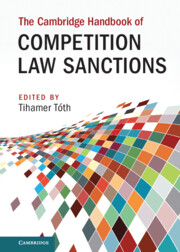Book contents
- The Cambridge Handbook of Competition Law Sanctions
- The Cambridge Handbook of Competition Law Sanctions
- Copyright page
- Contents
- Authors’ Affiliations
- Acknowledgment
- Part I General Chapters
- Part II Country Reports
- 17 Competition Law Sanctions in Austria
- 18 Antitrust Enforcement in Belgium
- 19 The Effectiveness of Competition Law Sanctions: Brazil
- 20 The Present Situation and Improvement Direction of the Sanction System in China’s Anti-monopoly Law
- 21 Application of the 2006 Guidelines on Fines by the European Commission and the Union Courts
- 22 Competition Law Sanctions in Germany
- 23 Competition Law Sanctions in Hungary
- 24 Competition Law Sanctions in Indonesia and a Comparison to Other ASEAN Member States
- 25 Competition Law Sanctions in Italy
- 26 Competition Law Sanctions in Japan
- 27 Effectiveness of Competition Law Sanctions: Kenya
- 28 The Enforcement of Competition Law in the Netherlands
- 29 A Barking Dog Seldom Bites
- 30 Effectiveness of Competition Law Sanctions
- 31 Competition Law Sanctions in Spain
- 32 The Swedish Competition Law Enforcement System
- 33 Effectiveness of Competition Law Sanctions: Turkey
- 34 Competition Law Sanctions in the United Kingdom
33 - Effectiveness of Competition Law Sanctions: Turkey
from Part II - Country Reports
Published online by Cambridge University Press: 29 July 2022
- The Cambridge Handbook of Competition Law Sanctions
- The Cambridge Handbook of Competition Law Sanctions
- Copyright page
- Contents
- Authors’ Affiliations
- Acknowledgment
- Part I General Chapters
- Part II Country Reports
- 17 Competition Law Sanctions in Austria
- 18 Antitrust Enforcement in Belgium
- 19 The Effectiveness of Competition Law Sanctions: Brazil
- 20 The Present Situation and Improvement Direction of the Sanction System in China’s Anti-monopoly Law
- 21 Application of the 2006 Guidelines on Fines by the European Commission and the Union Courts
- 22 Competition Law Sanctions in Germany
- 23 Competition Law Sanctions in Hungary
- 24 Competition Law Sanctions in Indonesia and a Comparison to Other ASEAN Member States
- 25 Competition Law Sanctions in Italy
- 26 Competition Law Sanctions in Japan
- 27 Effectiveness of Competition Law Sanctions: Kenya
- 28 The Enforcement of Competition Law in the Netherlands
- 29 A Barking Dog Seldom Bites
- 30 Effectiveness of Competition Law Sanctions
- 31 Competition Law Sanctions in Spain
- 32 The Swedish Competition Law Enforcement System
- 33 Effectiveness of Competition Law Sanctions: Turkey
- 34 Competition Law Sanctions in the United Kingdom
Summary
Turkish competition law provides a dual enforcement structure that consists of public and private enforcement. Although the legislator has attached considerable weight to private enforcement by enabling the claimants to sue for threefold damages, it is fair to say that the Act on the Protection of Competition mainly relies on public enforcement. The Act empowers the Turkish Competition Authority to enforce the law and sets out various sanctions, including structural remedies, which equip the Authority with broad powers in combating anticompetitive behavior. The prime sanction is administrative monetary fines which are based on the turnover of the infringing undertaking and can be set at a maximum level of 10 percent of the turnover of the infringing undertaking. The Act also authorizes the Authority to implement monetary fines to managers and employees in cases where they have considerable influence in the formation of infringement. Anticompetitive behavior is a misdemeanor; however, in bid-rigging, it can also give rise to a crime and trigger harsh criminal sanctions. It is generally accepted that the Act provides severe penalties for infringements; however, in practice, the sanctions have been applied somewhat inconsistently, basically due to the fact that enforcement policy lacks coherent policy goals.
- Type
- Chapter
- Information
- The Cambridge Handbook of Competition Law Sanctions , pp. 681 - 728Publisher: Cambridge University PressPrint publication year: 2022



